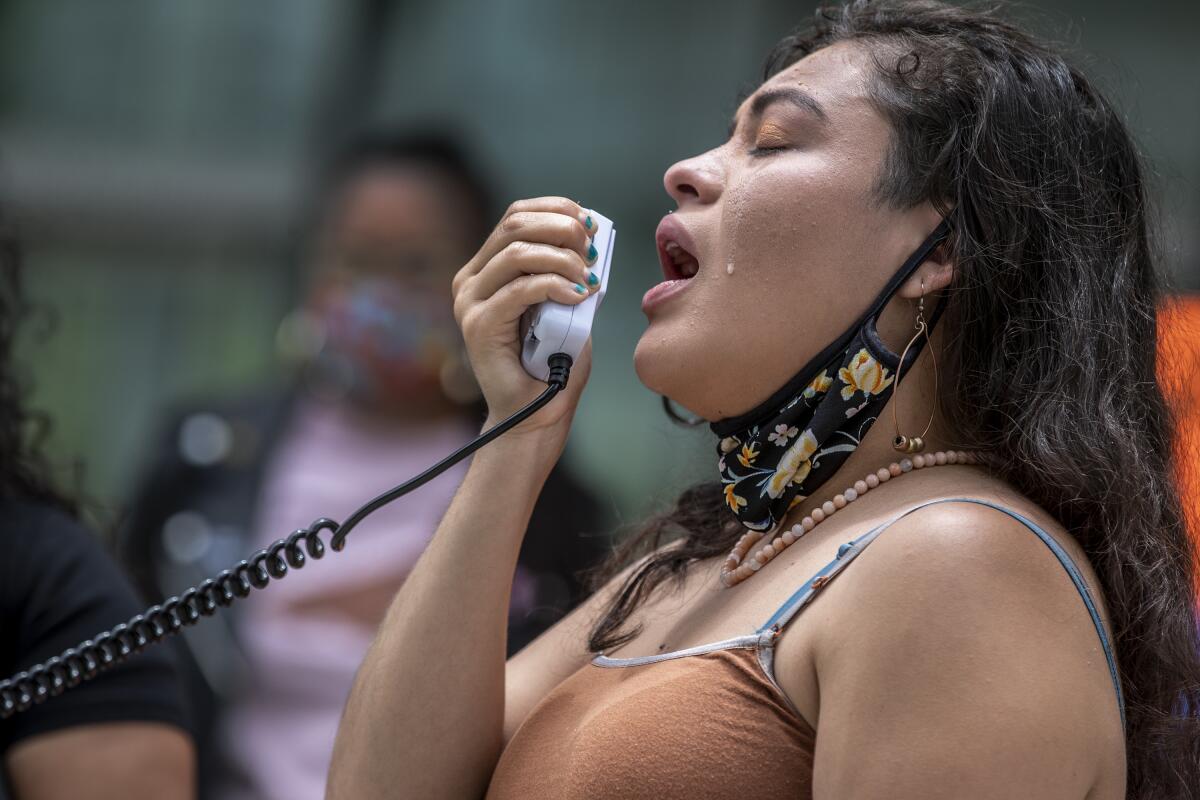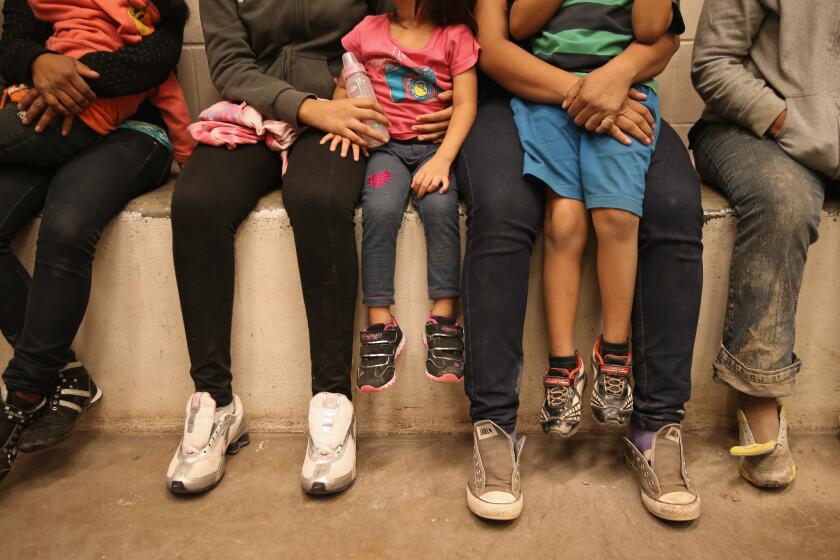As Biden narrows immigration focus, Dreamers try to stay optimistic

- Share via
Maria Lopez was skeptical when President-elect Joe Biden announced early in the year that he would send a groundbreaking legislative package to Congress that would overhaul U.S. immigration policy and offer a pathway to citizenship for 11 million people, including herself and her parents.
Lopez, 31, a Mexican immigrant who lives in San Jose and works at a local university, is a recipient of DACA, the Obama-era executive action that allows approximately 700,000 people living illegally in the United States, after being brought here as children, to receive a renewable two-year reprieve from deportation and become eligible for a work permit. Across three presidential administrations, so-called Dreamers — the greatest number of whom live in California — have waited for the U.S. government to grant them permanent residency.
Still, despite her wariness, on a desert hike during a recent vacation with friends, Lopez couldn’t help but keep tabs on her Instagram account, incessantly refreshing her phone’s browser to get the latest on President Biden’s speech before Congress, in which he outlined priorities for his first 100 days in office.
At that joint session of Congress on April 28, Biden called for legislators to make DACA (Deferred Action for Childhood Arrivals) permanent, even if it rejected his broader immigration policy goals. “If you don’t like my plan, let’s at least pass what we all agree on,” he said.
Biden’s shift from pushing a comprehensive bill to a more piecemeal approach that likely would benefit Dreamers like Lopez, but leave out millions of others, left her feeling disappointed, but not surprised.
“We’ve been promised so many things before,” Lopez said. “To me, it was just another white man making promises. I already didn’t have much hope. But I guess something is something, right?”
Biden’s speech in April marked a significant departure from past immigration strategy for the contemporary Democratic Party, presenting a new vision on how the party engages on immigration. Instead of going all in on a broad immigration overhaul, the party’s playbook is focusing on a more targeted approach, hoping for narrower immigration fixes.
Even if the new administration succeeds in grasping the relatively low-hanging fruit of DACA expansion, Biden’s speech signaled the end of tackling comprehensive immigration reform, said Roberto Suro, a public policy professor at USC, who has followed immigration issues for decades.
“Comprehensive immigration reform was already dead. It was dead for years. Now it’s really dead,” Suro said. “You now have an American president who went before Congress and said, ‘I’m not going to hold out for the big deal of a bill,’ even though he was the one who proposed the big deal. He said, ‘I will take what I can get.’ That’s a big change.”
Even before Biden entered the the White House, the administration tried to reassure supporters that incoming officials would gradually review, and likely reverse, some of Trump’s harshest measures.
Since taking office, Biden has paused border fence construction, lifted a ban blocking travelers from 13 mostly Muslim-majority and African countries and created a task force to reunite immigrant families who were separated at the U.S.-Mexico border by Trump’s 2018 “zero tolerance” policy.
But, most significantly, the Biden administration has kept in place the Trump-era pandemic measure known as Title 42, one of the most controversial and restrictive immigration strategies ever implemented at the U.S.-Mexico border. The policy closed the border to all nonessential travel and authorized the expulsion of asylum seekers without due process.
At the same time, the Biden administration has had to contend with a record number of lone migrant children from Central America who began arriving in Texas and other border states. Many of them are seeking asylum, which has been drastically curtailed in previous years.
Last week’s Trump-Biden debate raised questions about which administration first caged kids separated from their parents. We examined the record.
In an attempt to manage that seasonal surge of arrivals earlier this year, Biden and Vice President Kamala Harris, speaking last week in Guatemala, have warned hopeful migrants not to come to the U.S.
For more than a decade, Democratic legislators and some immigration advocacy organizations eschewed advancing narrower bills that provided immigration relief to certain categories of people. One group that stands out are DACA recipients and immigrant youth.
For 20 years, Democratic legislators sidelined different iterations of the Dream Act (Development, Relief, and Education for Alien Minors Act) in hopes of passing an ambitious bill that delivered immigration relief for the millions who are in the country without legal status.
That strategy failed.
“We can’t continue to repeat the mistakes of the past,” said Clarissa Martínez-de-Castro, deputy vice president of policy and advocacy at UnidosUS, the nation’s largest Latino civil rights and advocacy group.
“Before, when we pursued one option for immigration reform, we ended up with nothing,” she said during a panel about immigration policy held by the Brookings Institution, a nonprofit think tank. “This year must be different.”
While the U.S. Citizenship Act has lost traction, Biden and the Democrats are focusing on three separate bills.
Dating for people whose legal status is at best precarious can be fraught with anxiety and insecurity.
The American Dream and Promise Act, and the Citizenship for Essential Workers Act, would grant immigration relief to specific groups of immigrants: Dreamers and Temporary Protected Status (TPS) beneficiaries under the former, and farmworkers under the latter. The Farm Workforce Modernization Act would benefit farmworkers who are in the country without legal status.
While the Biden administration’s focus remains on taming the pandemic and restoring the economy, last month, in an effort to show his continued interest in immigration, the president met at the White House with six immigrant youths, three of them from California.
Many longtime activists are applauding the Democrat’s new strategy on immigration, even if it means forgoing comprehensive reform, at least for the time being.
Two years ago, the National Immigration Law Center (NILC), an immigration rights advocacy group, called for activists and politicians to break away from the old immigration reform model, calling it “outdated and flawed.”
When Biden unveiled his ambitious immigration plan to advocates in early January, Marieelena Hincapié, executive director of the National Immigration Law Center, said she tried to remain optimistic.
“We applauded it,” she said. “We wanted to see this as a new day. The vision he provided was a stark contrast to the last four years and put forth a vision of an America that recognized that immigrants are a strength to our country.”
But Hincapié said she also questioned where the Republican votes would come from. It’s become increasingly clear to many activists that a larger reform bill won’t garner support from the Republican Party, which has a different vision and veered even more toward the right during the Trump presidency, favoring stricter immigration enforcement policies.
“The Republicans are digging in their heels,” Hincapié said.
Jong-Min You, who lives in Brooklyn, New York, hopes the American Dream and Promise Act passes so that he finally can legalize his immigration status.
You, 41, was a baby when he and his parents left South Korea for the U.S. He and his parents came on a tourist visa but overstayed and fell out of status when he was 5 years old. Since then, he has not been able to fix his legal status, despite his best efforts.
‘I’ve been waiting in the sidelines for 20 years,” he said.
You became involved in the immigrant youth movement early on — around the mid-2000s — and advocated different incarnations of the DREAM Act. Though there were slight variations, all of the bills would have provided a pathway to legal status for immigrants who came to this country as children and resided in the country without legal status. None of the bills became law.
You calls himself an “original Dreamer,” but he was too old to qualify for DACA.
“We were the original Dreamers. That bill was for us,” You said about the group of immigrant youths who are now well into adulthood and without legal status.
“Think of it as a young kid when you saw everyone go to Disney World, but they cut it off for you and people keep going to Disney, but not you.”
More to Read
Sign up for Essential California
The most important California stories and recommendations in your inbox every morning.
You may occasionally receive promotional content from the Los Angeles Times.














